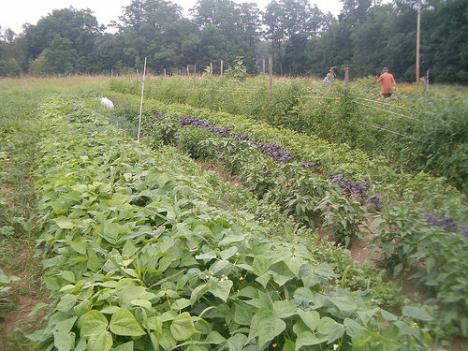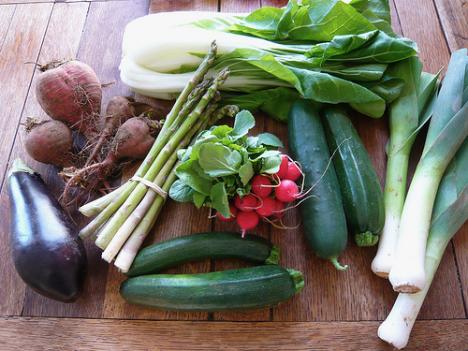7 Things You Didn't Know About Organic Agriculture
by Collin Dunn, Corvallis, OR, USA

Photo credit: eurleif
Even a casual TreeHugger knows that organic food is a greener option for the planet, but there's a lot more to growing it than just planting seeds in the sun, watering the sprouts (and skipping the pesticides) and talking to the plants as they grow; organic agriculture is a complicated, interesting, constantly changing process. Here are seven things you may not have realized about organic agriculture.

Photo credit: WordRidden @ Flickr
Organic agriculture sequesters lots of carbon
You may have heard that organic agriculture can sequester carbon, by retaining it in the soil, and that it can remove 7,000 pounds of CO2 from the atmosphere per acre every year. That's a big number; consider that an average Calliandra calothyrsus tree sequesters about 38 pounds per year, and that adds up to the same amount of carbon sequestered in about 184 trees per year. So, will organic agriculture be a reasonable weapon to fight a warming globe? As Mariann Fischer Boel, the E.U.'s commissioner for agriculture says, "Let's be clear: If we want to hit our greenhouse gas targets, we need all the ammunition we can get."It drastically reduces input costs
So, organic agriculture "saves" carbon in the soil, but it can also save big bucks when it comes to input costs of the day-to-day and ongoing agricultural operations. When it comes to oranges, for example, the largest single cost of production comes from the carbon-intensive nitrogen fertilizer; cut that single synthetic input out of the process, and it can save a huge amount of costs that add up to a drastically reduced carbon footprint.It drastically reduces "true" costs
Earlier this year, the UN Environmental Programme issued a pretty dire report about pending food crises at the hands of climate change. The report, The Environmental Food Crises: Environment's role in averting future food crises, came to a handful of striking conclusions. The findings include a scary future for those living in extreme poverty, who may end up spending a whopping 90 percent of their income on food -- ouch. And, up to 25 percent of global food production may be lost to "environmental breakdowns." Thankfully, organic agriculture can help make up the difference; in East Africa, employing organic agriculture can increase yields by over 100 percent, which can help make food supplies more consistent and cheaper.It helps make it a lot easier to be a vegetarian and vegan
Words like "organic" and "vegetarian" or "vegan" might naturally seem to go together, but that isn't always the case. Enter the Vegan Organic Agriculture movement, which aims to promote agricultural and horticultural techniques that avoid all animal inputs, including things like fish meal, bone meal, manure or slaughterhouse remains. Being organic to boot, artificial chemicals are off the menu, too. Their supporters include "people of many viewpoints, some involved in growing food, some not, but all united in recognising the need for a fundamental restructuring of food production methods and land use and their importance for human well-being and social justice, for animal welfare and biodiversity and in the battle for environmental sustainability."Organic agriculture will adapt to climate change more quickly
Because of its extensive use of compost and crop diversity, organic agriculture will also be able to better withstand the difficulties that climate change will bring, like higher temperatures and more variable rainfall. How? The high level of organic material maintained in soils does a lot of the work -- plants absorb carbon dioxide from the air and can put it (mostly) permanently into the soil.It won't kill you (and conventional industrial ag just might)
In June, a study emerged showing that so-called inert ingredients in Roundup, Monsanto's widely used flagship herbicide, can kill human cells even at low levels--"particularly embryonic, placental and umbilical cord cells," reports Scientific American. Used extremely widely -- on almost all of the US's corn and soy fields, covering tens of millions of acres of cropland, as well as by landscapers and on home lawns -- the "inert" ingredients in Roundup aren't good for you. Add to that all the recent (and necessary) hubbub over atrazine -- found to cause reproductive problems and hermaphrodism in frogs -- which is another herbicide in wide use in conventional agriculture, and your health (and the planet's) is in much less danger when you stick to organic agriculture.Organic agriculture isn't sustainable
Mother Jones reports that most of what we consider "sustainable" today simply is not - only 2 percent of the food purchased in the U.S. qualifies as sustainable, given the definition including producing more calories using fewer resources, be affordable, "ecologically benign" and also not abuse laborers and farmers in the process.While contemporary organic farms are held to stricter ecological standards, they are still trying to keep up with their conventional rivals in terms of production; that often amounts to measures of cost-cutting. The organic standards encourage farmers to replenish soils on site, via manure or crop rotations or no-till agriculture, or other organic practices. This is costly and to cut costs, some farmers just truck in manure from feed lots. Trucking in manure (causing more carbon emissions) from feed lots (which brings hormones, and other food safety issues into the mix) begs the question - is this organic item still the holy grail of food? Add to that how very hard it is to keep GMO-tainted seeds and food out of organic fields, meaning most of the items we call organic today are just "mostly" organic. True "organic agriculture" requires a large-scale paradigm shift -- one that's underway in small pockets around the world -- but until these hitches are worked out of all organics, we can't call organic agriculture "sustainable."
![]() To
subscribe or visit go to:
http://www.treehugger.com
To
subscribe or visit go to:
http://www.treehugger.com